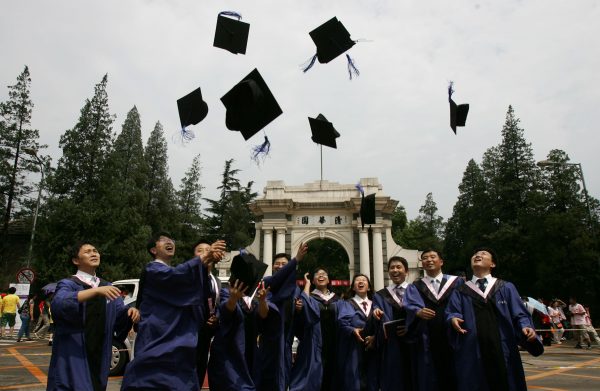Chinese Authorities Halt Plans to Build New Universities, Suggesting Population Crisis: Experts
News AnalysisMore than a dozen Chinese provinces recently announced that they have no plans to build new universities. China experts point out that with the decline in the country’s population, particularly a large number of COVID-19 deaths, there is a significant reduction in the college-age population, and universities will have trouble recruiting enough students in the near future. Chinese state media Southern Metropolis Daily reported on Jan. 16 that several new university projects were shelved in Guangdong Province. For example, Zhanjiang City rejected a proposal to establish the College of Health and Chinese Medicine. Jieyang City ended the construction of Puning University and Jieyang Health Vocational College. In December 2022, the Education Bureau of Foshan City also hinted that a joint project between the Foshan municipal government and the Hong Kong Polytechnic University would not proceed as planned. Other provinces, such as Heilongjiang, Shandong, and Shanxi, announced that they would not add or approve any more colleges or universities. Moreover, many regions around the country have set restrictions on new university projects, according to Southern Metropolis Daily. China’s National Bureau of Statistics (NBS) released the country’s population data for 2022 on Jan. 17, and for the first time since the 1960s, China’s population declined. Mainland China’s population, excluding foreigners, fell by 850,000 people in 2022 to 1.41 billion, with 9.56 million births and 10.41 million deaths in the year, according to the NBS report. Population Decline, Lack of Funds Li Yuanhua, a former professor at China’s Capital Normal University, told The Epoch Times on Jan. 18 that authorities are no longer adding new universities due to the population decline and, in turn, a reduction in the college-age population. Students throw their mortar boards into the air as they graduate during a ceremony held at Tsinghua University in Beijing on July 18, 2007. (China Photos/Getty Images) “With the decline in China’s population, including the population drop caused by the Chinese Communist Party virus or the CCP virus, which resulted in a large number of deaths, there is a shortage of students, and the existing universities are already in a status of oversupplying. If China keeps adding new schools, the universities will be in fierce competition for students. In fact, the existing universities are having difficulty meeting their quota.” Another problem is the lack of funds, Li continued. “Now the local government has no money, and the banks won’t invest in an industry with no future and no returns. The central government is also tightening the purse strings for new universities. Therefore, many provinces and cities announced around the same time that there would be no new universities,” he said. Regarding the rapid development of China’s universities in the past 20 years, Li said the main reason is the Chinese Communist Party’s (CCP) industrialization of education—operating schools like companies. “In the process of such rapid development, there is no guarantee of quality,” he said. “Nowadays, almost all students get higher education. The end result is that they have to face unemployment as soon as they graduate from college, which is a great burden to families and society.” Li also said that the CCP’s education development is not based on the needs of society, but on administrative orders. Moreover, local governments used to be enthusiastic about infrastructure development, including new universities, as the officials can get kickbacks from contractors. “In the process of expanding university enrollment, schools acted like wholesalers, ignoring the quality of education. This has led to a perverse development of higher education in China in recent decades,” Li said. A Consequence of the CCP’s Birth Control Policy Chen Weijian, a pro-democracy activist and editor-in-chief of Beijing Spring, said the halting of university projects in China is a manifestation of the negative consequences of the CCP’s one-child policy. “Now it is time for it [the CCP] to make this decision public,” Chen told The Epoch Times on Jan. 18, referring to Beijing’s decision to put an abrupt stop to university expansions. “It knew this situation was right around the corner but didn’t make it public; now it has reached this point when the CCP has to make it public.” According to Chen, many elderly professors in universities across China have died in the latest COVID-19 surge, including some prestigious professors. “I have received a lot of information regarding many old professors passing away. Some of them were trained in foreign universities in developed countries, and their academic standards were quite high,” Chen said. “So the future of China’s universities is not only the enrollment problem, but the university’s education level will also experience a cliff-like drop. The younger professors are nowhere near the older professor

News Analysis
More than a dozen Chinese provinces recently announced that they have no plans to build new universities. China experts point out that with the decline in the country’s population, particularly a large number of COVID-19 deaths, there is a significant reduction in the college-age population, and universities will have trouble recruiting enough students in the near future.
Chinese state media Southern Metropolis Daily reported on Jan. 16 that several new university projects were shelved in Guangdong Province. For example, Zhanjiang City rejected a proposal to establish the College of Health and Chinese Medicine. Jieyang City ended the construction of Puning University and Jieyang Health Vocational College. In December 2022, the Education Bureau of Foshan City also hinted that a joint project between the Foshan municipal government and the Hong Kong Polytechnic University would not proceed as planned.
Other provinces, such as Heilongjiang, Shandong, and Shanxi, announced that they would not add or approve any more colleges or universities. Moreover, many regions around the country have set restrictions on new university projects, according to Southern Metropolis Daily.
China’s National Bureau of Statistics (NBS) released the country’s population data for 2022 on Jan. 17, and for the first time since the 1960s, China’s population declined.
Mainland China’s population, excluding foreigners, fell by 850,000 people in 2022 to 1.41 billion, with 9.56 million births and 10.41 million deaths in the year, according to the NBS report.
Population Decline, Lack of Funds
Li Yuanhua, a former professor at China’s Capital Normal University, told The Epoch Times on Jan. 18 that authorities are no longer adding new universities due to the population decline and, in turn, a reduction in the college-age population.

“With the decline in China’s population, including the population drop caused by the Chinese Communist Party virus or the CCP virus, which resulted in a large number of deaths, there is a shortage of students, and the existing universities are already in a status of oversupplying. If China keeps adding new schools, the universities will be in fierce competition for students. In fact, the existing universities are having difficulty meeting their quota.”
Another problem is the lack of funds, Li continued.
“Now the local government has no money, and the banks won’t invest in an industry with no future and no returns. The central government is also tightening the purse strings for new universities. Therefore, many provinces and cities announced around the same time that there would be no new universities,” he said.
Regarding the rapid development of China’s universities in the past 20 years, Li said the main reason is the Chinese Communist Party’s (CCP) industrialization of education—operating schools like companies.
“In the process of such rapid development, there is no guarantee of quality,” he said. “Nowadays, almost all students get higher education. The end result is that they have to face unemployment as soon as they graduate from college, which is a great burden to families and society.”
Li also said that the CCP’s education development is not based on the needs of society, but on administrative orders. Moreover, local governments used to be enthusiastic about infrastructure development, including new universities, as the officials can get kickbacks from contractors.
“In the process of expanding university enrollment, schools acted like wholesalers, ignoring the quality of education. This has led to a perverse development of higher education in China in recent decades,” Li said.
A Consequence of the CCP’s Birth Control Policy
Chen Weijian, a pro-democracy activist and editor-in-chief of Beijing Spring, said the halting of university projects in China is a manifestation of the negative consequences of the CCP’s one-child policy.
“Now it is time for it [the CCP] to make this decision public,” Chen told The Epoch Times on Jan. 18, referring to Beijing’s decision to put an abrupt stop to university expansions. “It knew this situation was right around the corner but didn’t make it public; now it has reached this point when the CCP has to make it public.”
According to Chen, many elderly professors in universities across China have died in the latest COVID-19 surge, including some prestigious professors.
“I have received a lot of information regarding many old professors passing away. Some of them were trained in foreign universities in developed countries, and their academic standards were quite high,” Chen said.
“So the future of China’s universities is not only the enrollment problem, but the university’s education level will also experience a cliff-like drop. The younger professors are nowhere near the older professors in academia [regarding continued learning and research]. That is, we expect to see China’s overall academic level, university education, drop several levels.”
Kane Zhang contributed to this report.












